By Tareek Leonard
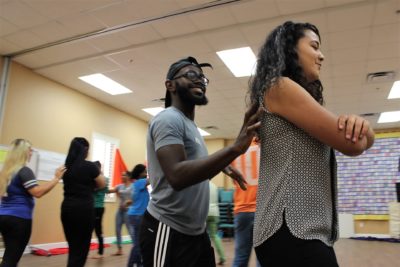 On September 30th at roughly 7:45am 17 people walked into the Hope CommUnity Center in Apopka, Florida and began to embark on an adventure by the name of “Theater of the Oppressed” led by Nadia Garzon. Many of us didn’t know what to expect; we just knew a few friends in our communities had signed up to participate in the event and it seemed interesting. But by 6pm on October 1st those same 17 people left the community center not only with a seemingly ethereal connection with all 17 people we participated with, but a better understanding of ourselves and a new way to process and possibly begin to heal from the wounds inflicted by many of the oppressions we face. We also left equipped with the know-how necessary to disseminate the healing skills we’ve learned to communities that may not have access to them. Theater of the Oppressed is a term coined by Brazilian Theater practitioner Augusto Boal in the 1970s to describe a theatrical practice he developed starting in the 1950s and evolved throughout his theatrical career after his exile from the country. With the styles of theorist Paulo Freire in mind and the backdrop of a military dictatorship in Brazil to guide him, he traveled to a slew of countries spanning from Argentina and Peru to France, developing his world changing practice.
On September 30th at roughly 7:45am 17 people walked into the Hope CommUnity Center in Apopka, Florida and began to embark on an adventure by the name of “Theater of the Oppressed” led by Nadia Garzon. Many of us didn’t know what to expect; we just knew a few friends in our communities had signed up to participate in the event and it seemed interesting. But by 6pm on October 1st those same 17 people left the community center not only with a seemingly ethereal connection with all 17 people we participated with, but a better understanding of ourselves and a new way to process and possibly begin to heal from the wounds inflicted by many of the oppressions we face. We also left equipped with the know-how necessary to disseminate the healing skills we’ve learned to communities that may not have access to them. Theater of the Oppressed is a term coined by Brazilian Theater practitioner Augusto Boal in the 1970s to describe a theatrical practice he developed starting in the 1950s and evolved throughout his theatrical career after his exile from the country. With the styles of theorist Paulo Freire in mind and the backdrop of a military dictatorship in Brazil to guide him, he traveled to a slew of countries spanning from Argentina and Peru to France, developing his world changing practice.
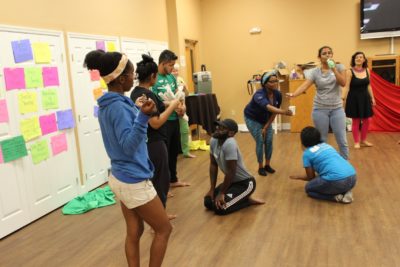 The main focus of TO (Theater of the Oppressed) is to counteract an arguably classist form of theater that people mainly engage in where they project their desires onto characters on a stage and obtain catharsis through watching those characters act out a scripted storyline which is often meant to perpetuate certain social paradigms. Instead of just simply watching, or spectating those actors Boal attempts to, and succeeds in, blurring the line between spectator and actor morphing those participators from passive spectators to active “Spect-Actors”, a term also coined by Boal. He did this by way of several techniques. Over time students of Boal took these techniques he developed and added their own personal flare to them. In this workshop we learned Garzon’s version of these techniques.
The main focus of TO (Theater of the Oppressed) is to counteract an arguably classist form of theater that people mainly engage in where they project their desires onto characters on a stage and obtain catharsis through watching those characters act out a scripted storyline which is often meant to perpetuate certain social paradigms. Instead of just simply watching, or spectating those actors Boal attempts to, and succeeds in, blurring the line between spectator and actor morphing those participators from passive spectators to active “Spect-Actors”, a term also coined by Boal. He did this by way of several techniques. Over time students of Boal took these techniques he developed and added their own personal flare to them. In this workshop we learned Garzon’s version of these techniques.
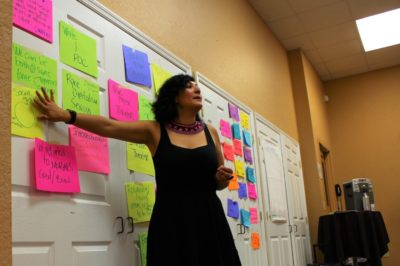 Three main forms TO may take on are Newspaper Theater, Forum Theater, and Image Theater. Over the span of two days we participated as Spect-Actors in all three of these forms. We began with Image Theater, which is arguably the easiest form of TO to grasp, but still extremely effective in transmitting its message. We were first asked to reflect on some of the oppressions we face and even share them with small groups formed from the 17 people. That in and of itself is, and was, powerful enough to move people to tears. Image Theater challenged us to take it a step further and as a group produce images depicting our oppressions and present them. This can be very vulnerable position for someone to be put in as they are asked to bring to the forefront their experiences pertaining to race, gender, sexuality, and class without the aid of words to buffer the impact. The images we produced allowed us to explore the experiences of many people including black women and undocumented citizens, and through displaying this vulnerability we were able to find healing in both small and large amounts.
Three main forms TO may take on are Newspaper Theater, Forum Theater, and Image Theater. Over the span of two days we participated as Spect-Actors in all three of these forms. We began with Image Theater, which is arguably the easiest form of TO to grasp, but still extremely effective in transmitting its message. We were first asked to reflect on some of the oppressions we face and even share them with small groups formed from the 17 people. That in and of itself is, and was, powerful enough to move people to tears. Image Theater challenged us to take it a step further and as a group produce images depicting our oppressions and present them. This can be very vulnerable position for someone to be put in as they are asked to bring to the forefront their experiences pertaining to race, gender, sexuality, and class without the aid of words to buffer the impact. The images we produced allowed us to explore the experiences of many people including black women and undocumented citizens, and through displaying this vulnerability we were able to find healing in both small and large amounts.
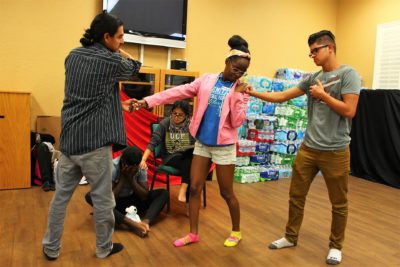 Next, we participated in Newspaper Theater, specifically in the practice of Out of Context Newspaper theory. This challenged us to use recent newspaper articles and take bits and pieces from them and use them to form our story. While in the Image Theater, we are able to use words that are our words, we are challenged in the Newspaper Theater to explain our experiences in words that are not organically ours–an experience many oppressed people face daily navigating everyday life. My group in particular ended up using a story made about the strength of a white US Soccer player to tell about the perseverance of a black woman through instances of misogynoir. And while there are many layers within even the optics of that to unwrap and attention definitely should be paid to the articles available to those that participated, the activity still provided everyone, including the black women in the group, some form of healing.
Next, we participated in Newspaper Theater, specifically in the practice of Out of Context Newspaper theory. This challenged us to use recent newspaper articles and take bits and pieces from them and use them to form our story. While in the Image Theater, we are able to use words that are our words, we are challenged in the Newspaper Theater to explain our experiences in words that are not organically ours–an experience many oppressed people face daily navigating everyday life. My group in particular ended up using a story made about the strength of a white US Soccer player to tell about the perseverance of a black woman through instances of misogynoir. And while there are many layers within even the optics of that to unwrap and attention definitely should be paid to the articles available to those that participated, the activity still provided everyone, including the black women in the group, some form of healing.
Finally we were tasked with the most engaging and, in my opinion, powerful, form of TO which is Forum Theater. One of the images that we produced from our Image Theater was selected and we were asked to act it out towards a very somber conclusion which in our case ended with a woman ending up in jail and missing her daughter’s college graduation. Then the small One Act was restarted, and at that point we weren’t simply asked what should’ve/could’ve been done to improve the 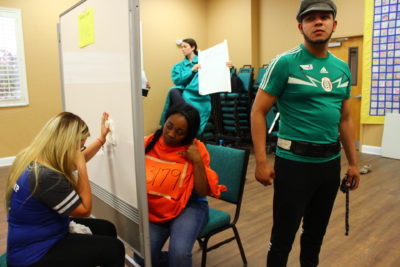 outcome. We were to actually step in and DO what we thought, once again without any words of explanation aside from our “lines”. While all the practices we learned were very moving and effective, I think this one in particular offers the most from which participants have to gain because they are finally able to take control of a situation they may have even personally experienced and do what in that time may have seemed too daunting or dangerous to do when it actually occurred. While we weren’t able to make a full on production in one day, we were definitely able to experience a sample iteration of it and were also given a framework from which we can disseminate to communities that will allow them to make their own productions depicting not only a form of their oppression but something much less seen: a way they make to overcome that oppression. This has powerful implications, as do all the other forms, for people in that it has the ability not only to provide catharsis, but spur people into action, which was Boal’s overall goal in creating TO.
outcome. We were to actually step in and DO what we thought, once again without any words of explanation aside from our “lines”. While all the practices we learned were very moving and effective, I think this one in particular offers the most from which participants have to gain because they are finally able to take control of a situation they may have even personally experienced and do what in that time may have seemed too daunting or dangerous to do when it actually occurred. While we weren’t able to make a full on production in one day, we were definitely able to experience a sample iteration of it and were also given a framework from which we can disseminate to communities that will allow them to make their own productions depicting not only a form of their oppression but something much less seen: a way they make to overcome that oppression. This has powerful implications, as do all the other forms, for people in that it has the ability not only to provide catharsis, but spur people into action, which was Boal’s overall goal in creating TO.
The idea of farm workers having intellectual domain over their own stories and having the power to morph them the way they want to is powerful, but even more powerful is the idea that this exercise on a microscale will become a catalyst for  macro scale actions which will aid in the quest for overall liberation. It is for this reason that I would recommend participation in this event as a must for farm workers alike and other organizers alike. In November, we will hold a second workshop at the Hope CommUnity Center to apply the skills we learned as facilitators and use Theatre of the Oppressed to create material supporting the Farm Labor Organizing Committee’s campaign for tobacco workers.
macro scale actions which will aid in the quest for overall liberation. It is for this reason that I would recommend participation in this event as a must for farm workers alike and other organizers alike. In November, we will hold a second workshop at the Hope CommUnity Center to apply the skills we learned as facilitators and use Theatre of the Oppressed to create material supporting the Farm Labor Organizing Committee’s campaign for tobacco workers.


